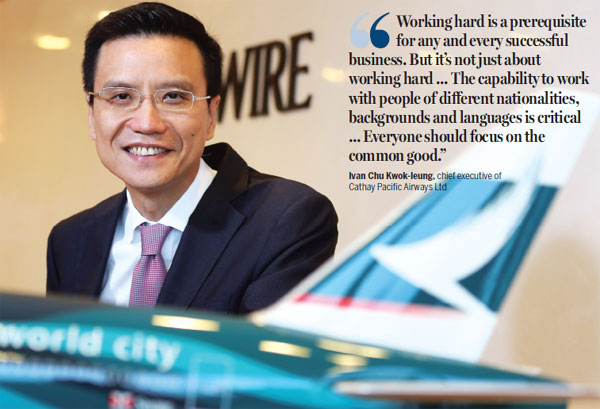On a learning curve
Updated: 2015-09-07 07:33
By Emma Dai in Hong Kong(HK Edition)
|
|||||||||
|
Ivan Chu Kwok-leung says Cathay Pacific is in possession of a "dream fleet" of aircraft and planning a "very balanced" flight network as it continues to add fresh long-haul destinations to its roster, which already sees it connect to nearly 200 airports worldwide. Parker Zheng / China Daily |
Only the second chief executive of Chinese origin in the entire seven-decade history of Cathay Pacific, an airline with a British backdrop since its very early days, Ivan Chu Kwok-leung is not very fond of people calling him a "Chinese CEO".
"I do not think myself as a Chinese CEO. I consider myself a CEO who happens to be Chinese," he said.
Leading a company with more than 33,000 employees representing 50 nationalities worldwide, and one that appointed a woman to the post of director of flight operations (Anna Thompson) on April 10 this year, Chu said diversity is the strength of Cathay Pacific.
"When it comes to promotions, we always focus on one issue, which is merit. The best person shall get the job," he said.
And yet, Chu told China Daily that working with people is what one needs to learn, particularly in a company employing multiple nationalities.
"Working hard is a prerequisite for any and every successful business. But it's not just about working hard," Chu said. "I've seen on different levels - even with some very senior persons - people sometimes have very big egos and don't work well with others. That limits career (growth).
"The capability to work with people of different nationalities, backgrounds and languages is critical. It's easier in good times. But when there is pressure and difference of opinion, I've seen people don't know how to handle it. I think everyone should focus on the common good and try to manage the differences."
Chu always reminds himself to keep learning. "I see management as a self-perfecting process," he said. "Many young people graduate from university and stop learning. That's how people grow old. But as a 70-year-old organization, we are still young and innovative. To stay sharp, we have to continue to ask ourselves those questions: how can we do better than before? How can we do better than our competitors?
"What worries me a lot about our organization is that we cannot get into premature aging - the past is always the best and we just do what was successful before. Then some disruption comes and we will be dead like a dinosaur.
"If you'd like to be forever young, you need to continue to grow and learn," Chu asserted.
That youthful curiosity is reflected in his reading habits, as foremost among the books to be found on his bedside table is A Curious Mind: The Secret to a Bigger Life by Brian Grazer and Charles Fishman.
"I couldn't put it down until I finished it. That's the best book I've read about curiosity so far. It's about how being curious enables that person to become the best Hollywood producer and many other things. Over the years, we become less curious, less willing to learn. But that's what we have to do to improve ourselves and stay young."
Another read Chu recommends is How Will You Measure Your Life? by Clayton M. Christensen, James Allworth and Karen Dillon.
"People plan their lives. But there is fate and fortune and we have to adapt. It's about people who have come through a lot of ups and downs. It's about how to work out the right life objectives for ourselves," Chu said.
"Everyone's objectives are different. But it's important that life is not a project for making money. If you lose the world then what's the point? (The book) reminds me to spend more time with my family."
emmadai@chinadailyhk.com
(HK Edition 09/07/2015 page5)
